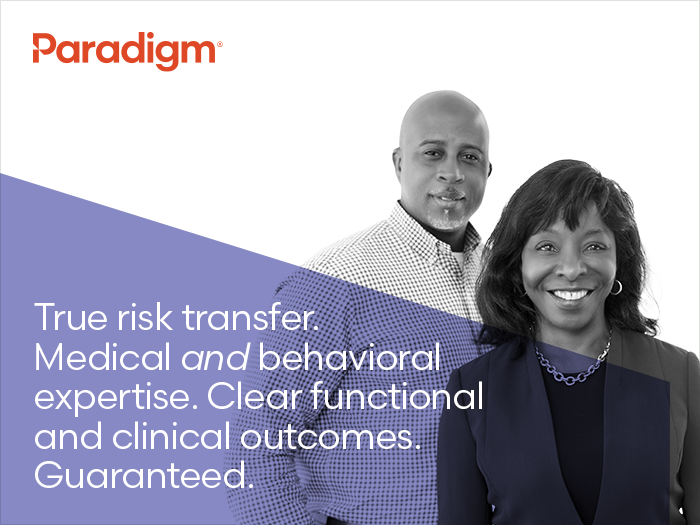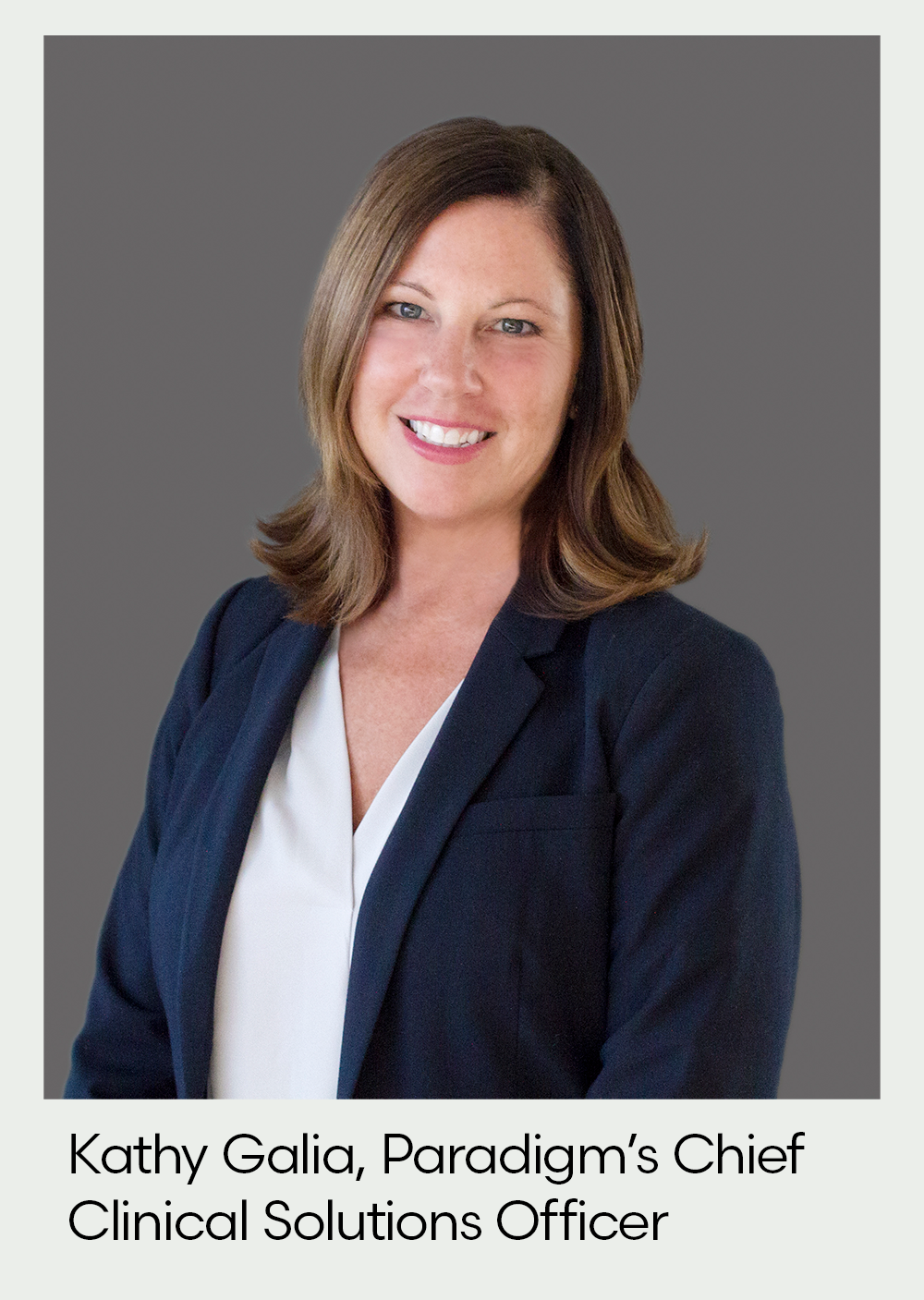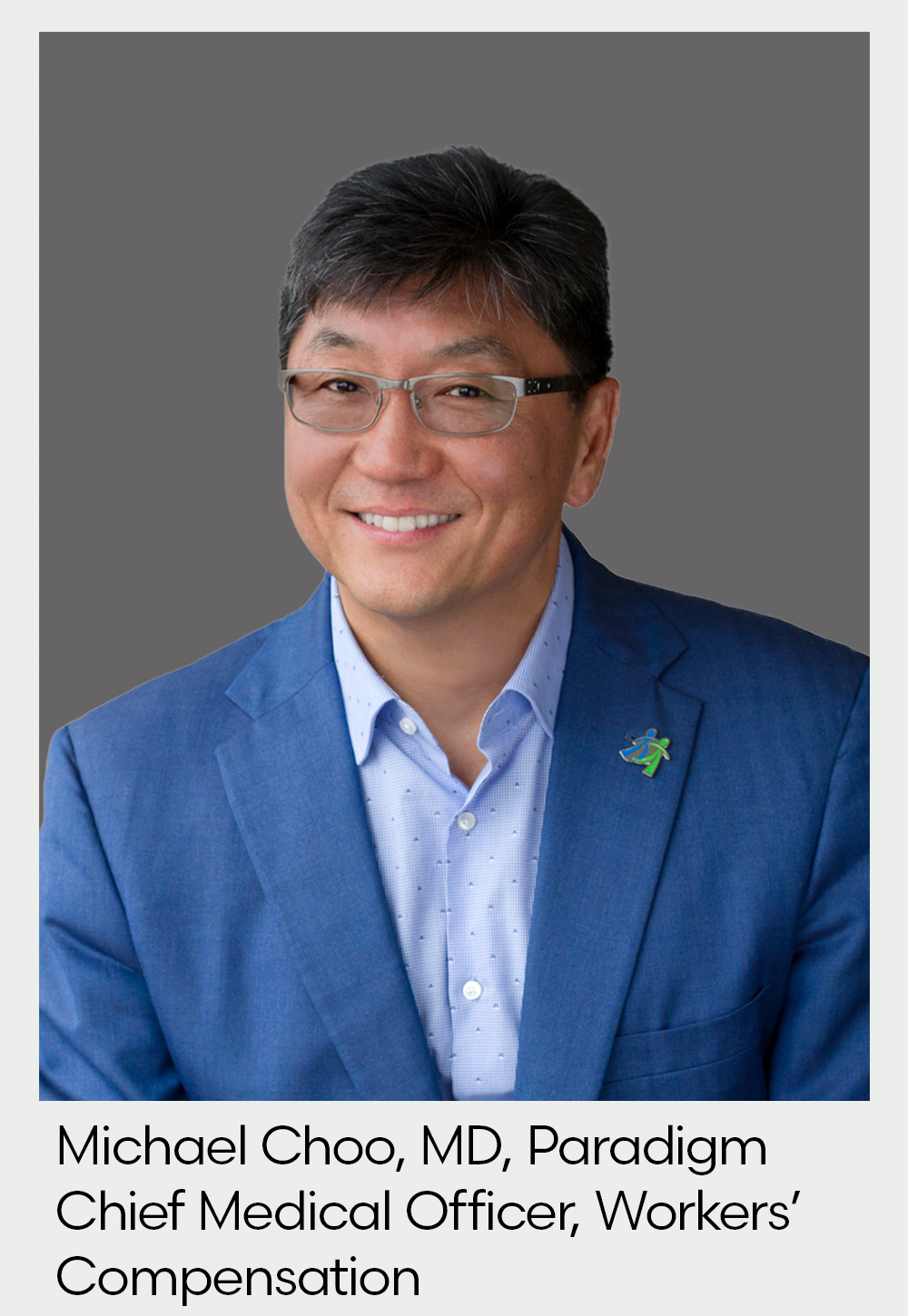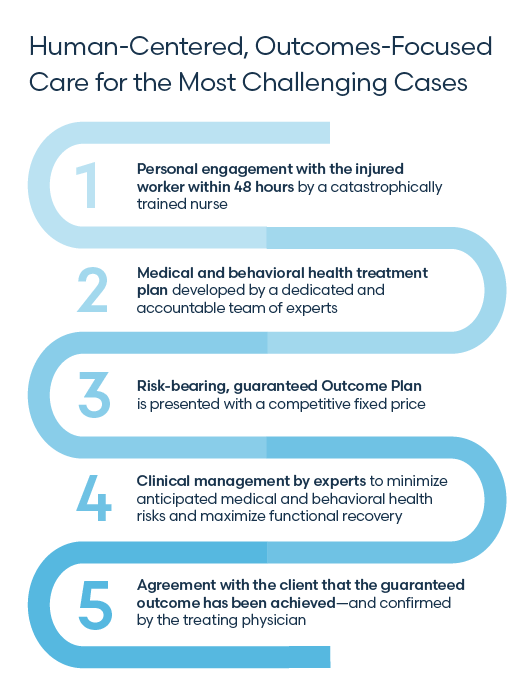Risk & Insurance
Full article on riskandinsurance.com
By: Paradigm
True risk transfer, medical and behavioral health expertise, and provable data-driven outcomes are the components of success in catastrophic and severe injury care.

Severe and catastrophic injuries—including traumatic brain and spinal cord injuries, burns and limb loss—are life-changing events for the people they affect. They also bring unpredictability for employers and claims professionals.
“These are long-tail, high-volatility cases,” said Kathy Galia, Paradigm’s Chief Clinical Solutions Officer. “To achieve the best possible recoveries and outcomes, stakeholders need to accurately predict lifetime claim cost and length.”
Reaching functional recovery milestones for injured patients while avoiding cost overruns requires specialized care management expertise. For decades, Paradigm has given clients peace of mind through a systematic model built on medical risk transfer, clinical expertise, comprehensive behavioral health support and provable outcomes supported by advanced data science.
Each component is essential to restoring health and hope for the most seriously injured workers and providing clarity, predictability and accountability to stakeholders.
The Only True Risk Transfer Company
 Life-altering injuries bring unending questions—and risk—around estimating costs, setting medical reserves, directing care and setting recovery goals. The ability to transfer risk to experts with dedicated resources, knowledge and established systems in place reduces volatility.
Life-altering injuries bring unending questions—and risk—around estimating costs, setting medical reserves, directing care and setting recovery goals. The ability to transfer risk to experts with dedicated resources, knowledge and established systems in place reduces volatility.
Paradigm HERO CatastrophicSM and HERO SevereSM Outcome Plans provide competitive, fixed pricing for early and accurate medical reserving and clear functional outcomes—guaranteed. As Galia explained, “Paradigm is the only true risk transfer company—we assume the risk until achieving a verifiable and mutually agreed-upon outcome with the client and the injured worker’s treating physician.”
To take on this risk while guaranteeing an outcome, Paradigm actively manages care based on incremental functional milestones tailored to each injured worker. An established list of milestone categories was developed by Paradigm clinicians based on 30 years of facilitating whole-person outcomes for catastrophic cases.
“Recovery milestones are a list of 10 to 20 functionally relevant achievements needed to reach maximum medical improvement,” explained Michael Choo, MD, Paradigm Chief Medical Officer, Workers’ Compensation. “Each achievement is based on the severity of the injury, health projections and recovery expectations.”
Throughout the recovery process, the dedicated Paradigm Management Team assigned to each case actively tracks benchmarks and shares progress with clients to assure alignment on care until the injured person achieves their ultimate global Outcome Achievement.
 A Team Built for Medical Management Expertise
A Team Built for Medical Management Expertise
Paradigm Management Teams deliver the specialized expertise needed to successfully coordinate care for catastrophic and severe cases. Seriously injured workers can expect to have more than 100 appointments across 60 medical providers in the first year. Half of these injuries require specialized home care, and 30% need long-term care.1
To successfully manage and coordinate complex recoveries, Paradigm selects and trains world-class nurses, physicians, and clinical and behavioral specialists to work as a cross-functional team. One team is assigned to each case. Paradigm Management Teams consist of:
- Network Managers: Catastrophically trained nurses providing face-to-face support and care coordination
- Medical Directors: Specialized physicians—matched to each worker’s injuries—who ensure consistent care
- Director of Clinical Solutions: Leaders with clinical and administrative experience in catastrophic injury management guiding teams toward evidence-based outcomes
- Clinical Specialists: Experts with ancillary care backgrounds, including home health and prosthetics
- Community Support Specialists: Behavioral health professionals supporting injured workers and their families for positive psychosocial adjustment
- Vocational Clinical Specialists: Rehabilitation experts identifying abilities and deploying resources for a return to gainful employment
- Director of Key Accounts: Client relationship managers collaborating to implement and coordinate overall service delivery
Paradigm clinicians receive unmatched levels of catastrophic injury-specific training to build upon their specialties. “Our experts are involved with top research organizations in their fields and are continually recognized for their accomplishments,” elaborated Dr. Choo.
This year, Medical Director Kenneth Parsons, MD received the American Spinal Cord Injury Association Lifetime Achievement Award for significant contributions to the field of spinal cord injury treatment.
In the area of limb loss and prosthetics, Clinical Specialist Kristin Reeves, PT, MS, and Medical Director Danielle Melton, MD, were featured in the Spring 2023 Journal of the Institute for Rehabilitation and Research.
Director of Clinical Solutions Mary Newton, PhD, was recently appointed to the Brain Injury Association of Michigan’s Board of Directors.
Integrated Behavioral Health Support for Whole Families
Paradigm has always been an innovator in whole-person, whole-family care for work-related injuries. Deborah M. Benson, PhD, ABPP, Vice President of Clinical Solutions, has been leading the integration of Paradigm’s behavioral expertise into the larger care model for over 15 years. This includes board-certified psychiatrists and neuropsychiatrists, psychologists and neuropsychologists, rehabilitation counselors and applied behavior analysts.

Clinical Specialist Timothy J. Feeney, PhD, is a behavioral psychologist with a career that has encompassed brain injury rehabilitation, special education, directing grant-funded projects and authoring numerous scholarly articles. According to Dr. Feeney, assessing pre-existing behavioral and psychological issues and factoring them into treatment plans is critical to returning workers to a high level of function while preventing the need for longer-term support.
Adjustment to the injury itself also plays a role in recovery. To achieve a mutually agreed-upon outcome, injured workers and families receive a thorough assessment of their psychosocial injury adjustment.
This includes evaluating factors such as mood, self-sufficiency and caregiver stress, and developing active management interventions based on the findings. Interventions, including family counseling and behavioral therapy, are at the core of care plans that ultimately support better outcomes.
Paradigm Medical Director David B. Arciniegas, MD, Immediate Past Chair of the International Brain Injury Association and President of the American Neuropsychiatric Association, believes Paradigm’s integration of medical and behavioral care management is both crucial and unique:
“The emphasis we place on outcomes, the development of evidence-based treatment plans, and the collaboration with interdisciplinary treatment teams—including behavioral health networks—is one that can and should serve as a model for general health care.”
Superior Paradigm Outcomes Through Clinical and Data Intelligence
Paradigm was founded as Paradigm OutcomesTM in 1991 to provide a then-missing focus on optimal catastrophic workplace injury management.
Achieving guaranteed outcomes for these exceptionally challenging cases has meant an unwavering commitment to client service, clinical excellence, data curation, results measurement and process improvement.
Today, Paradigm Outcomes mean provable results demonstrating a better life for injured workers and pricing confidence for clients, including 32% lower lifetime medical costs.2
Paradigm Outcomes also require close collaboration between Paradigm’s clinical and analytics teams to help solve complex problems and embed predictive modeling into Outcome Plans.
“Paradigm data analysts are leveraging advances in artificial intelligence, including machine learning and natural language processing,” said Chief Technology Officer Jason Cooper. “Getting helpful and accurate results from nascent artificial intelligence requires careful guidance from highly trained data scientists.”
Unmatched expertise and collaboration, combined with risk transfer, translates to life-changing results.
In one Paradigm case, after a catastrophic manufacturing accident resulted in limb loss, the injured worker encountered significant psychological, behavioral and substance-abuse challenges, including PTSD, major depression and increased alcohol use.
The Paradigm Management Team built an effective care management plan. It involved a Clinical Specialist consulting on pain management and behavioral care, a psychologist with traumatic injury experience providing extensive therapy, and the injured worker’s receipt of body-powered and myoelectric prostheses, among many other interventions.
Through multidisciplinary collaboration, the team helped this injured person reach key functional milestones and achieve release to return to work.
Proven, verifiable results, expertly trained clinicians and increased cost certainty with a guaranteed outcome are why Paradigm is the unmatched leader in catastrophic care management for the most unpredictable and difficult workplace injuries.
Refer a case today: referrals.paradigmcorp.com.
Sources:
1. Paradigm Data
2. Milliman Complex and Catastrophic Workers’ Compensation Claims Cost Analysis for Paradigm—October 2020